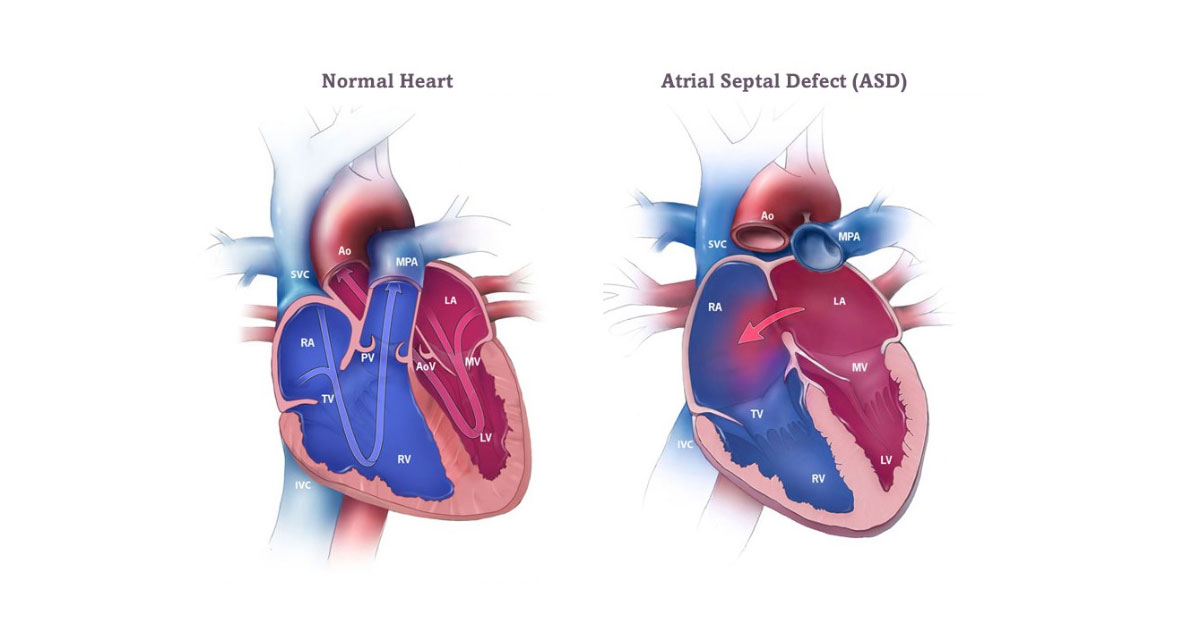An atrial septal defect is a birth defect of the heart in which there is a hole in the wall (septum) that divides the upper chambers (atria) of the heart. A hole can vary in size and may close on its own or may require surgery. An atrial septal defect is one type of congenital heart defect.
There are several types of atrial septal defects, including:
- Secundum : This is the most common type of ASD, where the opening is in the center of the atrial septum.
- Primum : This type is usually associated with other congenital heart defects and involves an opening lower in the atrial septum, near the tricuspid and mitral valves.
- Sinus Venosus : This type involves an opening near the superior vena cava or inferior vena cava, where blood returns to the heart from the body.
- Coronary Sinus : This rare type occurs near the coronary sinus, which is a vein that drains blood from the heart muscle itself.
Atrial septal defect can vary in size, and the severity of symptoms can also depend on the size of the defect. Small ASDs may not cause noticeable symptoms and might even go undiagnosed until later in life, whereas larger defects can lead to more significant problems.
Common symptoms and complications associated with ASDs include:
- Fatigue
- Shortness of breath, especially with physical activity
- Recurrent respiratory infections
- Arrhythmias (irregular heart rhythms)
- Stroke (if a blood clot passes through the ASD)
- Pulmonary hypertension (increased blood pressure in the lungs)
- Heart failure (in severe cases)
ASDs are typically diagnosed through physical exams, imaging studies like echocardiograms, and other tests such as electrocardiograms (ECG) or cardiac catheterization.
When should you see a paediatric cardiologist in Gurgaon?
Serious congenital heart anomalies, such as massive atrial septal defects, are frequently discovered before or shortly after birth.
If you or your kid experiences any of the following symptoms, contact your doctor:
- Breathing difficulty
- Simple exhaustion, especially after physical exercise Leg, foot, or belly (abdomen) swelling
- Palpitations are sensations of a fast, hammering heartbeat or missing beats.
Treatment
Treatment for atrial septal defect depends on the size of the hole in the heart and whether you or your child has other congenital heart defects.
Many atrial septal defects close on their own during childhood. For those that don't close, some small atrial septal defects might not require treatment. A doctor specializing in heart diseases (cardiologist) might recommend monitoring it with regular health checkups to see if it closes on its own.
Your pediatric heart specialist will discuss with you when you or your child needs treatment. Many persistent atrial septal defects eventually require surgery. However, closure isn't recommended if severe pulmonary hypertension is present.
The two primary treatment options are:
- Surgical Repair: This involves open-heart surgery to close the defect using stitches or a patch.
- Transcatheter Closure: In this less invasive procedure, a catheter is inserted through a blood vessel and guided to the heart, where a closure device (like an umbrella-like device) is placed to seal the defect.
Why choose Dr. Aseem Ranjan Srivasatva for atrial septal defect treatment in Gurgaon?
Dr. Srivastava is the most renowned pediatric cardiac surgeon at Artemis Hospital in Gurgaon, India. Dr. Srivastava has extensive experience in reconstructive surgery (oncology and babies) and is a strong advocate of early corrective repair whenever possible. Dr. Srivastava specializes in minimally invasive aortic and mitral valve surgery.
Also, you need to remember that the choice of treatment depends on various factors, including the size and location of the ASD, the patient's age, and their overall health.
Properly managed and treated, individuals with ASDs can lead healthy lives. You need to Regular follow-up with a cardiologist is essential to monitor the heart's function and address any potential complications.
Early diagnosis and appropriate intervention are key to preventing long-term health issues associated with atrial septal defects in your children.

